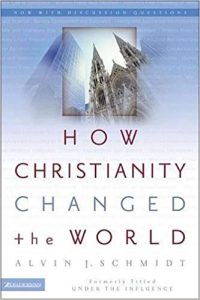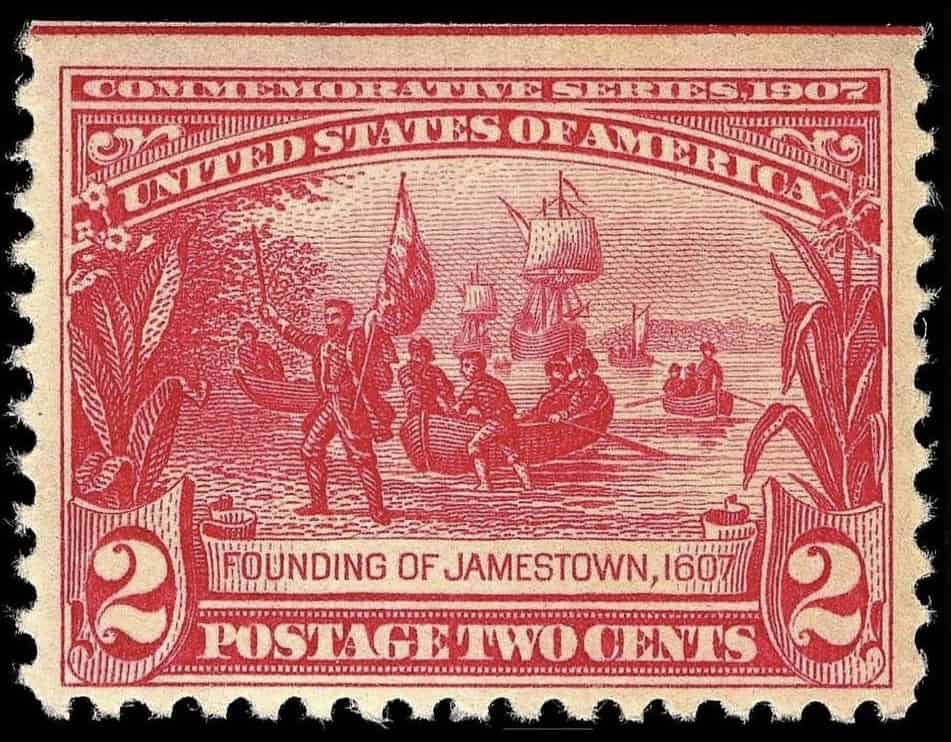The following text is excerpted from Alvin J. Schmidt’s landmark work, How Christianity Changed the World. You can purchase this resource here.
 The first English settlers in America landed in 1607 and called their settlement in the New World Jamestown. Headed by Captain John Smith, the colonists were economically organized as a socialistic community, requiring all the settlers to give all products of their labor to “the common store.” Individuals had no private property and no economic freedom. This system quickly turned disastrous, bringing famine and starvation. Said an early historian, “It was a premium for idleness, and just suited the drones, who promptly decided that it was unnecessary to work themselves, since others would work for them.”1 Even Smith’s threats that if someone did not work, he would not eat did little to improve the economic malaise. Thus, beginning in 1611, Governor Thomas Dale began abolishing the common store system, and four years later he had the London Company grant fifty acres of land to each colonist if he would clear the trees and farm it. The injection of private property and economic freedom brought about a dramatic change in Jamestown. Now the colonists worked and prospered. The new economic system demonstrated that socialism does not work. It also showed, as one observer once noted, that “Christianity is not a socialistic chimera, intended to renew the customs of the world before changing the heart.”2
The first English settlers in America landed in 1607 and called their settlement in the New World Jamestown. Headed by Captain John Smith, the colonists were economically organized as a socialistic community, requiring all the settlers to give all products of their labor to “the common store.” Individuals had no private property and no economic freedom. This system quickly turned disastrous, bringing famine and starvation. Said an early historian, “It was a premium for idleness, and just suited the drones, who promptly decided that it was unnecessary to work themselves, since others would work for them.”1 Even Smith’s threats that if someone did not work, he would not eat did little to improve the economic malaise. Thus, beginning in 1611, Governor Thomas Dale began abolishing the common store system, and four years later he had the London Company grant fifty acres of land to each colonist if he would clear the trees and farm it. The injection of private property and economic freedom brought about a dramatic change in Jamestown. Now the colonists worked and prospered. The new economic system demonstrated that socialism does not work. It also showed, as one observer once noted, that “Christianity is not a socialistic chimera, intended to renew the customs of the world before changing the heart.”2

A similar situation transpired in Massachusetts among the Pilgrims. When they landed on the shores of Cape Cod Bay in 1620 and set up the Plymouth Colony, they, like the Jamestown colonists, tried to equate Christianity with socialism. Their common store system also failed. The colony was experiencing economic disaster. Something had to be done. The colony’s governor, William Bradford, like Governor Dale in Jamestown, assigned all able-bodied persons or families a portion of land as their own in 1623. Before long the slothful and unproductive Pilgrims turned from laggards and idle-bodies to willing, productive workers. Men who previously “had feigned sickness were now eager to get into the fields. Even the women went out to work eagerly…. They now took their children with them and happily engaged in labor for their own family. The result was that the following harvest was a tremendous, bountiful harvest, and abundant thanksgiving was celebrated in America.”3 With the common stock system, “the Pilgrims had little incentive to produce commodities other than those needed for their immediate sustenance.”4
The new system, based on economic freedom, revealed for the second time in America that when people own their own property, they become animated and energetic rather than lethargic and dependent on others. Socialism could only work if human beings were totally sinless individuals who would always seek the best for their neighbor. That kind of person, however, does not exist. For as both the Old and New Testaments teach, man is a fallen, sinful creature who does not first seek his neighbor’s welfare. The psalmist says, “Surely I was sinful at birth, sinful from the time my mother conceived me” (Psalm 51:5). Similarly, the Apostle Paul declared, “For all have sinned and fall short of the glory of God” (Romans 3:23). Thus, while Christianity does not advocate a given economic ideology, its support of human freedom and private property rights provides fertile ground for the existence of a free enterprise economic system as opposed to a planned or command economy such as socialism or communism, where human freedom is severely curtailed and private property proscribed. Nor is Christianity opposed to people being thrifty and productive, which can and often has resulted in many individuals’ becoming wealthy. Abraham was one such person. Neither he nor his wealth were biblically condemned. It was not the possession of wealth that Christ condemned in the parable of the Rich Man, but the overattachment that the rich man had to his possessions.
While Christianity is not opposed to individuals becoming wealthy, it does not, however, countenance wealth as an end in itself. Christians have always been expected to use their acquired wealth to God’s glory and to the welfare of their neighbor, as Luther and Calvin frequently emphasized.
1John Esten Cooke, Virginia: A History of the People (Boston: Houghton Mifflin, 1897), 109.
2C. Schmidt, The Social Results of Early Christianity, trans. R. W. Dale (London: Wm. Isbister, 1889), 161.
3D. James Kennedy and Jerry Newcombe, What If Jesus Had Never Been Born? (Nashville: Thomas Nelson, 1994), 121.
4Harry M. Ward, Statism in Plymouth Colony (Port Washington, N.Y.: National University Publications/Kennikat Press, 1973), 38.
Schmidt, Alvin J. How Christianity Changed the World (pp. 211-213; footnote information 216-217). Zondervan. Kindle Edition.
This material relates to the Word Foundations article “Ditching Socialism in the New World.” Here is an excerpt from that post.
Investigate further:
Go here to read the Word Foundations article “A Look Back at Jamestown Shows Why the Social Justice Movement and Socialism, Despite All Their Appeals to Justice, Are Inherently Unjust.”
On March 28 and 29 of 2013, Dr. Schmidt was interviewed by Dr. James Dobson on Dr. James Dobson’s Family Talk. You can listen to and download these programs from the following pages.
